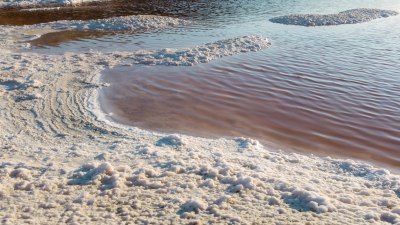Swimming With Closed Eyes in the Dead Sea
Experience the unique sensation and benefits of swimming with closed eyes in the Dead Sea.

The Dead Sea, known for its high salinity and mineral-rich mud, offers an unparalleled swimming experience. Many people flock to this remarkable body of water to float, relax, and enjoy its therapeutic properties. For many visitors, one of the most unique experiences is swimming with closed eyes. This approach enhances sensory awareness and allows for a deeper connection to the remarkable environment surrounding you. Whether you're a seasoned swimmer or trying it for the first time, swimming with closed eyes in the Dead Sea is bound to be an unforgettable experience.
The Unique Properties of the Dead Sea
One of the most compelling reasons to visit the Dead Sea is its distinctive characteristics. With a salinity level of around 30%, almost ten times saltier than most oceanic bodies, the Dead Sea provides a floating experience like no other. The salt content prevents sinking, allowing swimmers to lounge comfortably on the surface. Closed-eye swimming emphasizes this buoyancy, allowing you to focus on the sensations of weightlessness without visual distractions.
Benefits of Swimming with Closed Eyes
There are numerous benefits associated with swimming with closed eyes, especially in a setting as unique as the Dead Sea. First, the peacefulness and tranquility of closing your eyes can amplify your meditative state, enhancing relaxation and reducing stress. You may find yourself more attuned to your body's movements, the sensation of water, and the gentle sounds of nature around you.
Additionally, closing your eyes can improve your other senses. You might notice the warmth of the sun on your skin more acutely, the gentle lapping of waves against your body, or the unique mineral richness of the water. Fully engaging in these sensations can provide new levels of enjoyment and mindfulness.
Tapping into History
The Dead Sea is shrouded in history, and swimming with closed eyes can be a meditative way to connect with its rich past. The area has been a focal point for religious texts, ancient civilizations, and healing practices for centuries. By closing your eyes, you might find yourself pondering the historical figures who bathed in these waters and the firsthand experiences they might have felt.
This act can transform the swimming experience from mere recreation into a form of reflection and meditation. Imagine floating, feeling the mineral-enriched water, and contemplating the journey of those who came before you—it’s an enriching aspect of the overall experience.
How to Prepare for Your Swim
Before diving into the Dead Sea, preparation is vital. First, it's essential to understand your body's tolerance and avoid swimming with closed eyes if you have any eye conditions or concerns. It's also crucial to stay hydrated, as the high salt levels can lead to dehydration if you are not careful.
Additionally, consider the perfect time of day for your swim. Early mornings or later afternoons often provide the most pleasant temperatures and beautiful light conditions, making them ideal times for a swim with your eyes closed. The sun rising or setting creates a picturesque backdrop and allows you to focus on the warmth and sensations of the water.
Safety Tips
While swimming with closed eyes can be relaxing, it’s essential to prioritize safety. Always swim in designated areas, as the currents can change unexpectedly. It's advisable to enter the water gradually, allowing your body to adjust to the salinity before fully immersing yourself.
If you're with friends or family, establish a buddy system to ensure safety should anything arise. Though it's tempting to float alone with your eyes closed, having a companion close by will provide peace of mind and better overall safety.
As you wade into the Dead Sea, embrace the moment. Feel the unusual heaviness of the water supporting your body. Once you’re in a comfortable position, it’s time to close your eyes. Allow yourself to float gradually, feeling the buoyancy support you, while letting go of any tensions in your mind and body.
As you swim, consider focusing on your breathing. Inhale deeply through your nose, allowing your abdomen to expand fully, and then exhale slowly through your mouth. The rhythmic nature of your breath combined with the gentle waves will enhance your meditative experience.
Engaging with Surroundings
Even with your eyes closed, it’s easy to engage with your environment through other senses. Listen to the sounds around you—perhaps the faint echoes of laughter from fellow swimmers, the rustle of palm leaves swaying in the breeze, or the soft splashes as someone enters the water nearby. Embrace these auditory experiences; they are as much a part of the Dead Sea as the water itself.
Consider the smell as well. The distinctive saline scent can evoke various feelings and memories. Allow it to wash over you, adding depth to the physical experience. These elements form a complete sensory tapestry, enhancing your swim even as you choose to experience it with your eyes closed.
Cleansing and Healing Properties
The Dead Sea is famous for its mineral-rich waters, which are believed to provide numerous health benefits. As you float with your eyes shut, appreciate the therapeutic effects of the water on your skin. Many visitors report that the minerals help alleviate conditions such as psoriasis and eczema. Allow your body to soak in the rich minerals, feeling a sense of renewal and cleansing.
The mud from the Dead Sea, often used as a beauty treatment, can add another layer to your experience. Consider applying some mud before or after your swim, incorporating it into your overall routine. As you close your eyes, envision the minerals working their magic, revitalizing your skin and health.
A Mindful Experience
Incorporating mindfulness practices into your swim can enhance the overall experience. Often associated with meditation, mindfulness encourages being present and fully engaged in the current moment. Swapping visual stimuli for tactile sensations and auditory elements can lead to a more profound connection with your surroundings.
As you float, take mental notes of your feelings. How does the water feel against your skin? What thoughts come to you? Engaging in this level of introspection can transform a simple swim into a rich exploration of your mind and body.
Recognizing Limitations
While swimming with closed eyes can be enjoyable, it’s vital to recognize your limits. Ensure you’re aware of your swimming skills and never push yourself too far beyond what’s comfortable. If you start to feel dizzy or disoriented, feel free to open your eyes, re-orient yourself, and take a moment before continuing.
It's also important to be aware of your surroundings and the other swimmers nearby. Maintain a sense of openness while floating and take care to avoid potential collisions. Floating with your eyes closed while engaging in mindfulness can lead to an immensely gratifying experience—just ensure to stay safe and aware.
After Your Swim
Once your swim is complete, take a moment to reflect on the experience. How did it feel, connecting with nature while allowing your sense of touch and sound to guide you? Embrace the emotions that come up; it's all part of the healing journey the Dead Sea offers.
After leaving the water, it’s a great idea to rinse yourself off to remove the salt crust that may have formed on your skin. Once clean, consider applying some of the famous Dead Sea mud to other parts of your body for a soothing treatment before drying off. As the mud dries, you might feel another wave of mindfulness wash over you. This allows for a contemplation period, drawing all your senses back to the moment and what you've just experienced.
Swimming with closed eyes in the Dead Sea is much more than a simple recreational activity; it's a multi-sensory, meditative experience that fosters awareness and connection. The unique properties of the water, the historical context, and the health benefits unite to create a transformative experience. From preparation and safety to reflection and mindfulness, each aspect plays a vital role in shaping your journey. So, if you ever find yourself at the Dead Sea, consider taking the plunge with your eyes closed—you may uncover a world of sensations and emotions waiting just beneath the surface.











